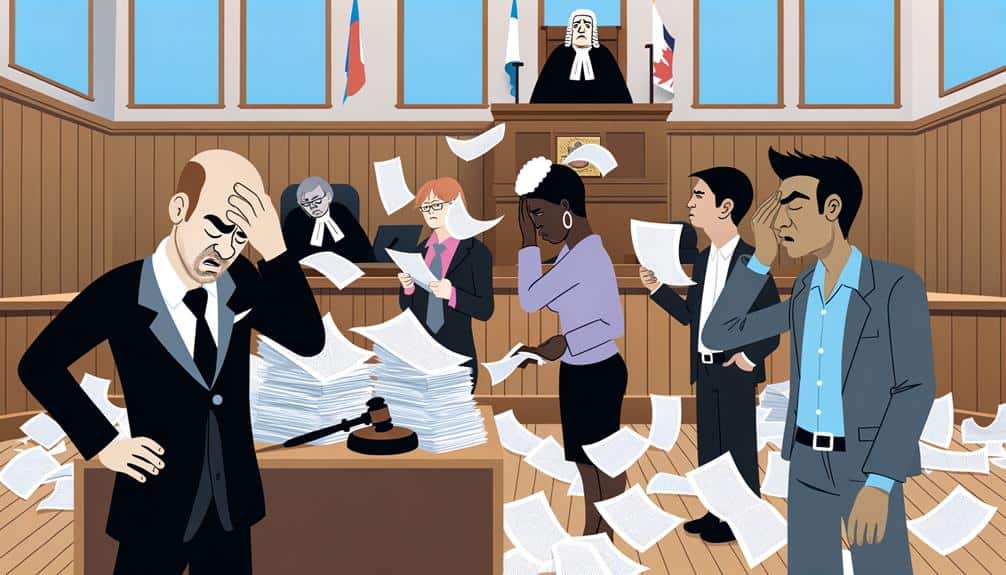
Sam and John are currently in the midst of a highly contentious divorce. They are struggling to come to an agreement regarding the division of their property as well as co-parenting arrangements. The Court has ordered John to sell a house and transfer the proceeds to Sam. However, John refused to sell the home and has instead made it his primary residence. He has even threatened the realtor who is trying to sell the property. John’s defiance of the Court is further compounded by his multiple meritless applications to the Court, which aim to revive past settled complaints. This conduct has left Sam in a state of distress, facing both emotional and financial hardships.
John’s refusal to comply with the Court’s order, coupled with his multiple filings of baseless legal challenges, strongly suggests the behaviour of a vexatious litigant. If this sounds like a situation you might be facing or you suspect you are dealing with someone who persistently misuses the legal system to harass you or delay your matter, know there are strategies to manage such situations effectively. Consider reaching out to a Spectrum Family lawyer to go over what options are available to you.
Definition and Identification of Vexatious Litigant
To understand vexatious litigation in Alberta, you must grasp the defining characteristics and indicators that identify individuals engaging in such behaviour. There is no set definition for vexatious litigants in Alberta. However, the Judicature Act identifies vexatious behaviour as including: initiating legal actions that lack merit or are brought forward with the intent to annoy, harass, or subdue another party rather than to resolve a legitimate dispute. Such behaviour may involve repetitive, unsubstantiated claims, or using the legal system as a tool of oppression. For instance, suing for emotional abuse in Alberta without substantial evidence or reasonable grounds could be deemed vexatious if the intent is to intimidate or burden the other party.
- Persistently starting legal actions to solve a problem that has already been resolved by a court.
- Repeatedly filing lawsuits that are unlikely to succeed or that have no reasonable expectation of providing relief.
- Persistently using the court system for reasons that are not legitimate or fair.
- Often repeating the same arguments in new lawsuits, even though those points have already been addressed in prior lawsuits.
- Persistently failing to pay the legal costs ordered by the court when they lose a case.
- Persistently appealing court decisions without success.
- Persistently behaving inappropriately in court.
Vexatious litigants will often target others with unwarranted lawsuits, burdening the court system with baseless claims that waste time, money, and resources. These individuals frequently file multiple lawsuits that lack factual basis and resort to excessive or disproportionate remedies.
When encountering a vexatious litigant, it is crucial to act fast and seek help from a Spectrum Family lawyer. A vexatious litigant can prolong the resolution process, increase legal costs, and add emotional stress for all parties involved, especially if there are children involved.
Legal Tools and Strategies to Address Vexatious Litigation
If you believe you are dealing with a vexatious litigant, there are tools available to you. You can apply to the Court to declare someone a vexatious litigant. You can also seek additional costs against a vexatious litigant. These applications are often complex and require following strict Court procedures. Contact a Spectrum Family lawyer to see if these options are right for you.
- Alberta Court’s Civil Practice Note No. 7 (CPN7): This practice note outlines the process for filing a vexatious litigant order. The CPN7 process primarily involves evaluations in writing, with strict deadlines and protocols.
- Court Orders and Legal Strategies: Courts can issue vexatious litigant orders, and individuals can seek cost awards. Monitoring and restricting court filings and utilizing alternative dispute resolution methods are effective strategies for managing vexatious litigants.
Judicial Response to Vexatious Litigation
The judicial response to vexatious litigation involves utilizing mechanisms that safeguard the integrity of the legal system and protect against abusive legal actions.
- Judges have the discretion to stay, dismiss, or strike out claims that are deemed vexatious.
- Individuals can be declared as vexatious litigants, leading to restrictions on court access and the need for court approval before filing claims.
- Mandatory legal representation may be required in future proceedings to prevent further vexatious actions.
These responses aim to maintain the efficiency of the legal system, prevent the misuse of legal processes, and ensure that legitimate cases are not overshadowed by frivolous litigation. By implementing these measures, the courts can effectively address vexatious behaviour, protect the rights of all parties involved, and uphold the principles of justice within the legal framework.
Consequences of Being Declared a Vexatious Litigant
The consequences of being declared a vexatious litigant are significant and carry lasting implications within the legal system. Once labelled as such, one may face limited court access and require specific permission to file any claims.
Moreover, one might be mandated to have legal representation for future proceedings, which will increase their legal expenses and potentially restrict their ability to pursue certain legal actions independently. Additionally, applications will only be considered by the Chief or Assistant Chief Justice, and specific restrictions will be in place to prevent any further abusive litigation practices.
Being declared a vexatious litigant not only hampers an individual’s legal pursuits but also contributes to the overall effort to maintain the efficiency and integrity of the legal system. Understanding these consequences is crucial to navigating the legal landscape effectively and upholding the principles of justice and fairness for all parties involved. Consider contacting a Spectrum Family lawyer if someone is alleging you are a vexatious litigant.
Key Takeaways
- Vexatious litigants burden courts with baseless claims, drive up legal costs, and delay matters.
- Courts can impose restrictions and award costs against vexatious litigants.
- Consequences involve limited court access and legal representation.
Conclusion
Facing or being accused of vexatious litigation can be daunting, but you are not without options. Spectrum Family lawyers are well-versed in dealing with the complexities surrounding vexatious litigants. A Spectrum Family Lawyer can help you understand your unique situation and guide you toward the most effective solution.
Whether you are on the receiving end of a baseless legal action or are concerned about being labelled a vexatious litigant, our team is here to support you every step of the way. Contact a Spectrum Family Lawyer to help you navigate through these pressing times and begin working towards a resolution that protects your interests.
References
Alberta Rules of Court, Alta Reg 124/2010
https://canlii.ca/t/565q0
Judicature Act, RSA 2000, c J-2
https://canlii.ca/t/561bs
Belseck v Bond, 2022 ABKB 845 (CanLII)
https://canlii.ca/t/jthxf

We currently have three offices across Alberta — Edmonton, Calgary, and Red Deer. We serve the entire province of Alberta (and BC). We also have the infrastructure to work with any of our clients virtually — even the furthest regions of Alberta.
Call 1 (855) 892-0646 (toll free) to get routed to the best office for you or contact us online for general inquiries.
We also have a dedicated intake form to help you get the ball rolling. Our intake team will review your specific case and advise you on the next steps to take as well as what to expect moving forward. That’s the best way to schedule an appointment
Our offices are generally open 8:30 a.m.—4:30 p.m., Mon—Fri.

The Legal Review Process by Spectrum Family Law
- Spectrum strives for high-quality, legally verified content.
- Content is meticulously researched and reviewed by our legal writers/proofers (usually local law students).
- Details are sourced from trusted legal sources like the Family Law Act.
- Each article is edited for accuracy, clarity, and relevance.
- If you find any incorrect information or discrepancies in legal facts, we kindly ask that you contact us with a correction to ensure accuracy.



